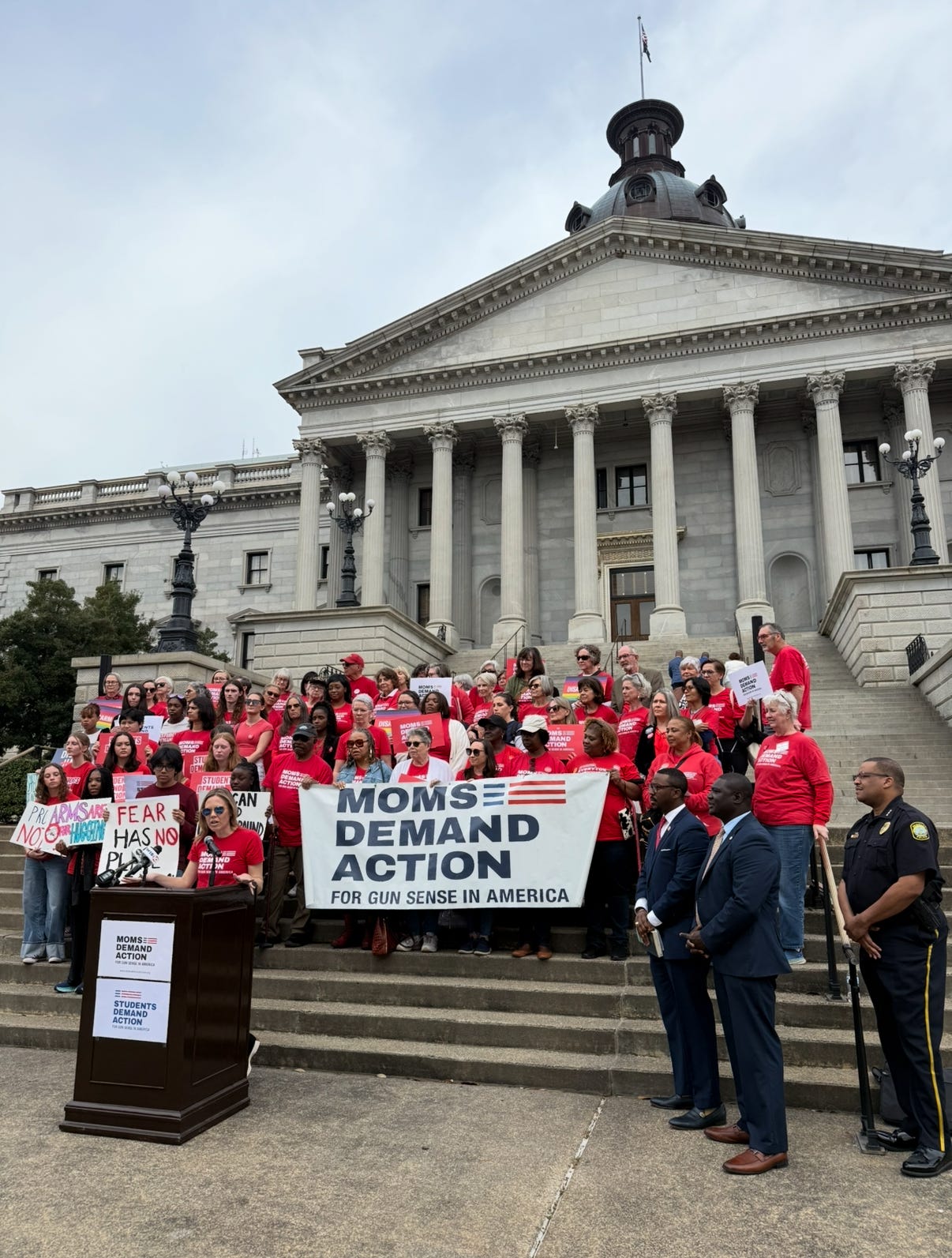I joined the South Carolina chapter of Moms Demand Action, our nation’s largest grassroots gun violence prevention organization, in 2018 in the wake of the tragic mass shooting at Marjory Stoneman Douglas High School in Parkland, Florida. Actually the first action I took after that shooting was to call South Carolina’s esteemed (sarcasm font) Senators, Lindsey Graham and Tim Scott. It was immediately clear they weren’t going to do anything about this public health crisis. So I took matters into my own hands.
On Thursday I had the privilege to speak on the steps of the Statehouse during Moms Demand Action Advocacy Day, alongside students, survivors, lawmakers and fellow concerned South Carolinians.
Here are my remarks:
In my work in South Carolina, I’ve seen kids who fall asleep to the sound of gunfire and wake up to news of another shooting in their neighborhood. Kids who know exactly how to hide when they hear a loud pop but don’t have a safe place to play. Kids who have lost siblings, parents, friends—who carry more grief in their small bodies than any child ever should.
For too long, many of my colleagues in the health sector have stood on the sidelines when it comes to gun violence. They fear being perceived as “political,” or lack support from our institutions or employers. But I refuse to accept that our gun violence crisis is just “the way things are.”
As a parent and a longtime member of this community, it is my duty to fight like hell for these kids and their right to grow up safe. So that’s exactly what I’ve been doing.
I’ve presented at medical schools all over the country, talking to future physicians on why we need to get political for our kids. I’ve been vocal in the press and on social media — and like every other person who shares their views on social media, I’ve acquired a truly lovely collection of hate followers and extremist trolls. As you can see, they haven’t stopped me, and they won’t.
Then, I ran for Congress to represent the Lowcountry against Nancy Mace — someone who once had common sense on this issue, but has since abandoned every shred of reason, principle, and responsibility to our kids. At every turn in my campaign, I fought for gun safety. Gun violence prevention was one of the issues that inspired my run in the first place, and the fact that our kid's lives are at stake fueled me to the finish line.
I lost my race. Again, as you can see, that hasn’t stopped me from speaking out. And it won’t.
But in all the years that I’ve spent doing this work, there’s one question that I’ve gotten over and over again: “How does gun violence impact children and teens?”
If I had a dollar for every time I’ve been asked that question, I could buy DOZENS of eggs. Even in this economy.
Here’s the truth: the answer to that question — and I know this is never what anyone wants to hear from a doctor — is I don’t know.
I don’t know the full impact of gun violence on our kids. Don’t get me wrong, physicians are on the frontlines of this crisis. We’re the ones prepping the trauma bay after receiving that all-too-familiar call, or holding the hands of bereaved parents as we tell them their child has died from injuries sustained from gun violence. We’re also conducting urgently necessary research around this epidemic to inform policy and cultural solutions.
But it’s nearly impossible to know the many impacts of gun violence on our children. Because we can’t quantify the total number of panic attacks kids experience in the aftermath of a school shooting.
There’s no way to measure all the moments of stigma or silence teens face after their friend dies by gun suicide.
Or the number of lost hours of sleep after a child’s parent is shot and killed, or the pain that comes with a re-hospitalization to treat a non-fatal gun injury.
Or how many times our kids are looking over their shoulders so they know where the nearest exit is.
Guns are the leading cause of death among children and teens in South Carolina. Without question, it is impacting our children every day.
But we can’t track all this fear—the way it lingers in our classrooms, on playgrounds, in quiet moments before bed. We will never be able to count how many dreams have been stolen because of easy access to guns, or completely grasp all the ways our kids' futures will be shaped more by what they’re afraid of than by what they dream of.
However, here’s the good news: we do know what works to prevent gun violence.
How do we know? The research. The SCIENCE! Remember when you could say something like that and it didn’t sound “political”? And the science behind gun safety laws have unequivocally proven them to be effective in reducing gun violence.
For example: research shows us that closing the Charleston loophole could have prevented deadly shootings like the shooting death of nine worshipers at Emanuel A.M.E. Church. The shooter was legally prohibited from owning a firearm, but because of this uncompleted background check, was able to purchase the firearm.
Firearm sales should not be permitted to move forward until a background check on the prospective purchaser has been completed. That’s not an opinion. That’s a proven evidence point that will save lives.
Gun violence is nonpartisan. It is a public health crisis indiscriminately devastating families across our state and our country. As we all stand here once again in deeply red, deeply gerrymandered South Carolina, we are proving that we’re not ready to give up on our state yet. We’re not backing down. We want a safer future for our kids and our communities. Our lawmakers should too.





